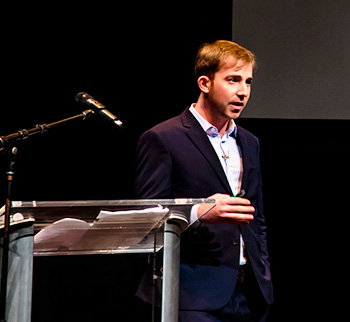TORONTO — People show greatness when the stakes are high, Rabbi Rafi Lipner, executive director of The House, an organization that seeks to cultivate a deep appreciation of Jewish values and traditions in Jewish young adults, told an audience of 550 at The House’s third annual JEDx event.
A variant on the popular TED talks, JEDx, which stands for Jewish Ethics Defined, was created as a platform for young Jews to be inspired by the stories of innovators who have integrated Jewish values into their personal and professional lives.
Held May 20 at St. Lawrence Centre for the Arts and primarily attended by Jewish young professionals, this year’s theme was “No Compromises,” and the four featured speakers discussed different ways they have stuck by their values.
In his opening remarks, Rabbi Lipner stressed that only when people have strong values is the notion of “no compromises” relevant.
Jonathan Medved, founder and CEO of the global equity crowdfunding platform OurCrowd, spoke about embracing traditional Judaism as a young adult and how it has seriously enriched his life.
“I’ve never looked at being Jewish as ‘giving stuff up,’ but as what I got from it,” he said, describing how he’s woven Jewish values into his work life, such as giving his employees chol hamoed off on Sukkot and Passover and establishing a kosher kitchen in his office.
He said his observance of Shabbat has given him a healthy work-life balance.
“I’ll tell you this much: when Friday afternoon comes, I’m gonna be mellow. I’m going to be smelling the cooking, thinking about taking that first sip of single malt and playing with my grandkids… There’s no such thing as an opposition between culture and Judaism. You can have it all.”
The next speaker was Cheryl Reicin, a partner at Torys LLP and an internationally renowned lawyer specializing in life sciences and technology.
Reicin spoke about a life-altering experience she had at age 26.
Already a lawyer, she was flying back to her former home of New York from a vacation in Israel when the crew discovered a note someone had left in the washroom saying there was a bomb on the plane.
As the plane turned back, Reicin grew contemplative, reflecting on what she had done in her life so far to “move the dial.”
Though she had experienced considerable career success, Reicin felt she hadn’t done enough to make an impact.
When the flight landed safely and she returned home, Reicin began making changes. She got involved in legal work for Israeli biotech companies, she eventually joined a number of foundation boards, and she started a program with help from UJA Federation of Greater Toronto called Genesis, which runs a Jewish mentoring program.
“What keeps me sane is Shabbat. People ask me if it’s impeded my career, but I say with 100 per cent certainty that it’s enhanced it. I’d never be able to keep this pace without it.”
Next up was Lynda Fishman, a social worker, inspirational speaker and author of Repairing Rainbows, a book about rebuilding her life after her mother and sisters were killed in a plane crash when she was 13.
She’d promised herself she would have a happy and fulfilling life despite this tragedy, and she described building a family, reinventing herself through several career changes – from hospital social worker to camp director to author – and inspiring others to be resilient.
The final speaker was Michael Katchen, the 27-year-old founder and CEO of WealthSimple, an “accessible” wealth management company.
He described how, in putting immense energy into figuring out his company’s values, he’d briefly neglected investigating his own individual values.
He shared what he’s since reflected on: that it’s important to live deliberately, to surround yourself with people who will keep you honest, to hold yourself accountable and to “live up to your values even when no one’s watching.”
The latter principle has been informed by his Jewish values, he said, which have taught him to strive to become his ideal self. “Many of us here are just starting our careers, and this is the time to think about who we want to be and how we can get there, so we don’t wake up in 20 years and go, ‘This isn’t who I wanted to be.’”
